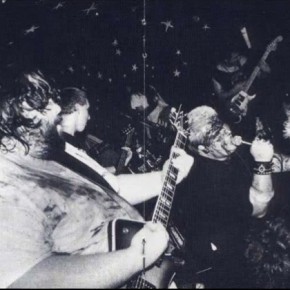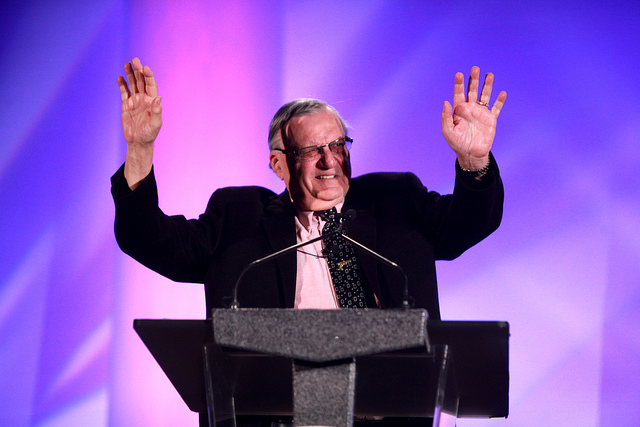Tucson is waist deep in a Sonoran June, but nobody’s getting wet. The bridges span riverbeds without rivers, their surface clotted with plants that struggle to remember moisture. The heat works its way deeper and deeper into the psyche. Even in the luxury of air-conditioned spaces, the body senses its relentless onslaught. Yet inside this Volkswagen speeding down Oracle Road, life is beautiful.
“Leave your troubles outside,” Joel Grey instructs us. “Outside, it is winter. But in here, it is so hot.” The irony hits me. Even this early in the morning, the heat is rippling across the landscape. “Every night,” he continues, “we have to battle the girls to keep them from taking off their clothes.” Every day this week, as my wife and I have been driving our daughter to her summer camp, I’ve asked myself whether lines like this are “appropriate” for a seven-year-old. Skylar is completely fixated on the soundtrack to Cabaret, insisting that we play it over and over. The more we oblige, though, the more likely the musical’s disturbing qualities will register with her.
We’ve worked so hard to keep her sheltered. It’s the summer of 2006. And despite the unprecedented availability of “adult” content on the internet, the temptation that we have to slip back into our pre-parenting ways, Skylar won’t even learn the F word for three more years. When she skips ahead to the title song, though, it’s clear that she has memorized every line. “I used to have a girlfriend known as Elsi, with whom I shared four sordid rooms in Chelsea. She wasn’t what you’d call a blushing flower. As a matter of fact she rented by the hour.”
I’m so busy contemplating the strangeness of hearing her warble such post-innocent sentiments that it takes me a while to realize that she has stopped singing in order to point something out. “Look over there. It’s a cabaret. Can we go there sometime?” I’ve driven this stretch for years without paying heed to Curves Cabaret, one of Tucson’s many strip clubs. My wife makes eye contact with me. What do we do now?
“That’s a different kind of cabaret, Sweetie.” Skylar seems satisfied with her mother’s explanation. But I’m not. Because, if you think about it, the difference is slight. And that realization sets my mind racing, contemplating all the ways in which Cabaret is actually a perfect soundtrack for us. After all, we’re doing our best to deny the reality that stares us in the face. Yes, we’re warding off the heat, which longtime residents of the desert refer to as “winter in reverse,” since keeping it at bay is so expensive. There’s a lot more to it than that, though.
All around us, life is aggressively disappointing. The sharp right turn that American politics took in the wake of 9/11 is greatly magnified here in the Arizona desert. We aren’t just blocking out the heat in our air-conditioned bubble, but the ideology it appears to serve. The Republican areas of the West have long been a bastion of ressentiment, where people who profess to love freedom spend their time pondering all the forces conspiring to take it away. Since the terrorist attacks, though, the sense of injury that grounds their identity has been raised to a higher power.
Looking at the bumper stickers on the vehicles around us or, as I sometimes force myself to do, listening to the vitriol of local talk radio, I am struck by the degree to which revenge is advocated. Al Qaeda is a target, obviously, as well as the “Arabs” who got the United States into trouble in the first place. But so is the Federal government, which lords over the land with its vast array of bureaucratic entities, telling people where they can’t drive or shoot or, most importantly, live, while at the same time refusing to police the border with Mexico properly. At least, that’s what the fearful enragés of the Right would have us believe.
This is 2006, so the ire is not directed at the President. In the conservative reaches of the United States, George W. Bush has somehow managed to convince people that he is as much a “victim” of Washington has they are. They grumble about Big Government just as they’ve done since the Progressive Era. But despite their reservations about the rapidly growing Federal budget and the restrictions on personal freedom being enacted in the name of keeping them safe, they don’t blame Bush.
Fast forward a few years. Now that a Democrat and, what’s worse, a person of color with a “foreign” name is in the White House, the impulse to seek revenge for political injuries is now focused on the President and his supporters. Unlike the vast majority of the United States, Arizona moved rightward 2008. By the time the campaiging for the 2010 mid-term elections is underway, the state has become the standard bearer for the fight against “socialism.”
It doesn’t matter that President Obama has consistently advocated a political trajectory Richard Nixon would have loved. His name and appearance make him the perfect focal point for the rage against everything from Islamic Fundamentalism to the Environmental Protection Agency. In the mind of your average Arizona conservative, he embodies otherness to such an extreme degree that he demands to be demonized. He is, in short, the Enemy.
This is the mindset that rules Arizona today. Whether the topic is illegal immigration, abortion, gun laws, ethnic studies, or birth control, conservative lawmakers in Arizona have done a remarkable job of turning this talk radio resentment into political capital. The respect for national institutions that would once have stayed their hands has given way to an anti-Washington fervor eerily reminiscent of the secessionists in the antebellum South. But are these politicians’ rhetorical and legislative sallies just for show, the political correlate to Fox News, peals of thunder over a bone-dry plain?
Within the relatively progressive confines of central Tucson, where most of my friends and Facebook acquaintances live, people grumble about the right-wingers “up in Phoenix,” meaning both the home of the Legislature and the state’s biggest metropolitan area, just as they have for decades. In a state where governors have regularly been indicted for misdeeds and malice towards Democrats is a long-standing tradition, the latest assault on liberal values feels like more of the same, the operative word being “more.”
But things look different beyond the state’s borders. To be sure, Arizona has periodically appeared on the national radar from time to time, most notably during Barry Goldwater’s 1964 Presidential campaign and during the late 1980s and early 1990s, when resistance to celebrating Martin Luther King Jr.’s birthday as a holiday led to a well-publicized boycott. For the most part, though, Arizona used to be grouped together with other Western states, a minor piece in the puzzle of libertarian conservatism. It fell on the ideological map more or less where it falls on the geographic one, between Texas and Southern California.
Since Senator John McCain lost to Barack Obama in that 2008 Presidential election, however, the state he represents has become a major player in national politics. Republican leaders in Arizona took advantage of their strength as the Tea Party movement started to build up steam in 2010. Because they were in a position to push through ideological legislation, they had the opportunity to set an example for right-wingers in other states. And that’s precisely what they have tried to do.
Even as Arizona conservatives competed with each other for headlines, they managed to give many outsiders the impression that they were engaged in a grand collective undertaking. As the 2012 Presidential primaries have demonstrated, the Republican Party is dangerously close to imploding, its different constituencies unwilling to unite behind a candidate to take on the President they all seem to hate. That problem is evident in Arizona, too. But lawmakers’ willingness to take on the Federal government, however quixotically, has suggested an alternative approach to national politics.
If states consistently refuse to comply with Federal dictates, it could provoke the sort of constitutional crisis of which coup-d’êtats are made. That’s the sort of bold talk one hears on conservative radio programs, where hosts let their callers push ideas to extremes. In Arizona, though, it’s increasingly the talk one hears in the halls of government itself. Discourse that would once have been considered treasonous has come to sound positively routine.
The recent press conference in which notorious Maricopa County Sheriff Joe Arpaio announced that his volunteer “posse” had determined that Obama’s long-form birth certificate was probably a forgery is a prime example. Despite a poor track record in the job he is being paid to do and a long history of grandstanding at his fellow conservatives’ expense, Arpaio remains a popular figure in the state. For many, the fact that he is the subject of a Federal investigation more than compensates for his failings.
There are insiders who will tell you that “no one takes Arpaio seriously,” that he is an entertainer who has worn out his welcome in the political arena. But the same people will tell you that Governor Jan Brewer is a fool and the majority of the Legislature even more foolish. The real Arizona, they insist, is hidden behind the headlines. It wasn’t that long ago, they point out, that the state had a Democrat in charge. Some pollsters even considered Arizona a swing state in 2008, its massive population growth of the past few decades a sign that it would soon cease to be a Republican stronghold. Even now, the extreme unpopularity of the President hasn’t stopped former Surgeon General Richard Carmona from believing he can win retiring Senator John Kyl’s seat for the Democrats.
The problem with this line of reasoning is that it presumes being taken seriously is a prerequisite for taking power. But from the success of right-wing commentators Bill O’Reilly and Rush Limbaugh to that of liberal heroes Jon Stewart and Stephen Colbert, it is clear that more and more Americans prefer to get their news indirectly, with a wink and a smile. In a context where laughter opens doors, it doesn’t make sense to regard it as a liability. Even President Obama, who has clearly spent a lot of time practicing how to seem as sober-minded as possible, makes it a point to have jokes in many of his speeches.
I’m not ready to declare this desire to be entertained by politics a danger in its own right. As the history of the Eastern Bloc demonstrated, finding humor in politics can lay the foundation for positive change. What worries me about the emphasis on entertainment is the degree to which it can be exploited by extremists.
If years of studying the National Socialists’ rise to power have taught me anything, it’s that the political figures who seem easiest to laugh off sometimes end up laughing last. Hitler was the object of ridicule for years during the Weimar Republic. Even after the Nazis took control of the national government in 1933 — something they achieved without ever winning a parliamentary majority, incidentally — plenty of Germans were sure that they represented an absurd interlude that would just have to be waited out, like a stretch of bad weather.
Indeed, as improbable as it may now seem, the this-will-pass mindset showed such remarkable staying power that many Germans who could and should have left the country as soon as possible refused to leave until it was too late. Reading the letters they sent to family and friends who had already emigrated is a chilling experience, because it is painfully clear that the ridiculousness they perceived in Hitler and his henchmen gave them a reason to hope unreasonably. Joseph Goebbels undoubtedly realized that his propaganda machine was making it easier to mock Hitler, both home and abroad. But Goebbels was clever enough to recognize that the energy spent making fun of the Führer could be collected and redeployed in order to consolidate the Nazis’ power.
I have long been a critic of those who invoke fascism too readily. Living in the San Francisco Bay Area for over a decade, I grew weary of leftists who used the term to tar even middle-of-the-road opponents. Your average University of California administrator may be an inefficient bureaucrat or a pawn of the Regents, but is almost certainly not a fascist, closet or otherwise. And the way in which right-wing commentators have repurposed the concept of fascism to brand Big Government has threatened to render it completely useless. There doesn’t seem to be much point in calling someone a fascist if the criteria for party membership are that lax.
But I’m starting to wonder whether it’s time to rethink my terminological conservatism. I’m not claiming that a NDSAP-style organization is about to take over the state of Arizona. The American commitment to individualism is far too strong to make that kind of lock-step ideology into a coherent mass movement. But the techniques that brought the fascists to power can be applied in a range of contexts. They did a masterful job of provoking outrage and then using that negativity as a source of strength. Over and over, they took actions meant to leave their opponents incredulous, asking how anyone could take the Nazis seriously. And each time they pushed the envelope further, so that what had only recently been considered outrageous would end up seeming run-of-the-mill.
At first the Nazis pushed their agenda from the margins, activists who seemed to have little chance of governing. But as the Great Depression took hold, the popularity of radicalism on both the right and left increased enormously. Unlike the Communist Party, however, which had concentrated its efforts in their industrial strongholds, the Nazis were in an excellent position to ride the anti-establishment feeling into power. The reason? After their electoral disappointments in the late 1920s, they had decided to focus much of their energy on rural and small-town Germany, hoping to win the offices in local and state elections that they had not been able to secure at a national level.
Since the residents of these areas were already the most conservative in Germany, prone to be suspicious and resentful of the modern lifestyle possibilities in big cities like Berlin, this strategy was already starting to pay dividends before the full extent of the global crash had become apparent. In 1931, for example, the Nazis did well enough in elections for the small state of Braunschweig that they were able to share power in the new government.
Victories like this helped to legitimate them politically, while also giving the opportunity to experiment with illegitimate means of increasing their power. Instead of repeating the mistake of Hitler’s infamous “Beer Hall Coup,” trying to take power all at once, the Nazis instead undertook a long march through Germany’s provincial backwaters. By the time the Nazis made their move to take over the whole nation, their ideology and iconography were already firmly established elements in the political landscape. It’s a progression that Cabaret does a remarkably good job of communicating.
Could a similar normalization of extreme ideas be underway in the United States? Even as poll after poll documents a liberalization in American attitudes with regard to controversial issues such as gay marriage, medical marijuana, extramarital sex and intellectual property, conservatives in the country’s smaller, more rural states have managed to pass a range of measures that would turn back the clock fifty years or more. And this legislative push is no haphazard affair, but the result of careful planning by right-wing groups who have been greatly dissatisfied with the pace of “progress” at the national level.
What makes Arizona particularly significant in this context is that, unlike states like Alabama, Kansas or South Dakota, the population is much larger and located predominantly in two large metropolitan centers. Despite its large number of retirees, the state looks a lot more like the future of the United States — or at least how that future looked in the recent past, before the global recession — than the other states at the vanguard of the conservative backlash against the depravities of postmodernity.
Significantly, the fantasy of regional identity that animates conservative Arizonan politics is largely the product of the recent past, after World War II, when air conditioning and irrigation made it possible to stud the state’s arid lowlands with single-family tract homes. Although an amalgam of Wild West, Spanish colonial and Native American stereotypes surfaces in that fantasy, the vision of happiness it conjures is ultimately suburban, shaped by the shopping mall more than the spectacular landscape plowed over to build it.
To invoke traditional values in such a context is a strange exercise. But the absence of a longstanding tradition in which to ground them can actually make reactionary morality powerful. When most of the people who live in a place were born somewhere else and have self-consciously immersed themselves in the culture, however paltry, of their new home, the desire to return to a less complicated mode of existence is strong. The sense that tradition is fragile and improvised goes hand in hand with an intense fear of the new.
This helps to explain why Arizona, one of the youngest American states — 2012 is its centennial year — is so full of people who reject progressive thinking. And it also highlights the special political danger the state poses at a time when the divide between American liberals and conservatives is widening at a rapid pace. Because however unenlightened Arizonans may seem, they do not reside in a backwater. The extreme actions of its legislature aren’t simply the reflex of an entrenched establishment clinging to an outmoded worldview, as was the case in states like Mississippi and Alabama during the 1950s and 1960s.
That’s why I made the decision, years before my daughter learned the word “fuck,” to teach her the other F word: fascism. She might not have understood the lines she was singing from Cabaret back in 2006, but I made sure she understood the musical’s political subtext. Because, just as the distinction between the nightclub in the story and Tucson’s own Curves Cabaret was more tenuous than I would have liked, so too was the one between its Weimar Republic setting and the state of our state. Although I reassured her at the time, to paraphrase Sinclair Lewis’s title, that it wasn’t likely to happen here, I wanted her to be ready to recognize the parallels should the trends of the post-9/11 era continue.
The more I think about what it has been like to live in Arizona since 2000, the more I realize the danger in taking shelter from the political “heat” in cultural pursuits. Tucson in particular has a rich tradition of alternative living. If you spend enough time hanging out with artists and musicians or hiking in the spectacularly beautiful parklands all around the city, you can forget just how bad things are in the state and fail to see how much worse they could one day become. The brilliance of Cabaret is to demonstrate that it is ultimately impossible to keep the real world from intruding on one’s special places. Outside it is the middle of June. Inside, our political air conditioning is in desperate need of repair.






I too try to be very careful about the terminology I use when describing situations and people. But, these days, when I hear from a teacher in Tucson who has a “minder” (my word) standing in the back of the classroom judging whether or not the teacher is adhering to the new “don’t say hola” rules (my description of the new rules about individuality trumping ethnicity)…. a lot of scary terms come to mind that perhaps we should be shouting.
The far-right is running amok in Arizona and unless there are more people who are slightly left of amok who stand up against the, dare I say, fascists, things are going to get much worse. Turning up the air conditioning or music won’t keep it out for long.
Thanks Charlie, for giving us all food for thought and Arizonans a call to action.
That fascistic future could be expedited if conservatives ever learn to wholeheartedly embrace Latinos, many of whom are, at least, culturally conservative. People who assume increasing Latino demographic automatically works to Democrats’ advantage are mistaken.
Craig: I’d heard about that prohibition. How ironic that my daughter’s district has a mandatory Spanish program that starts in third-grade for everyone when TUSD has such restrictions — forced on them, to a large degree, by “Phoenix,” even if the district has acting stupidly — in place. So deeply disturbing. I’m glad you got the air conditioning reference, too. Thanks for writing.
Russ: That’s true. I’m reminded, though, of something I heard versions of when I was living in Germany as an exchange student: “If only Hitler hadn’t gone after the Jews so irrationally, the Nazis would have ended up doing a lot of good.” Or, more extremely, “If only Hitler hadn’t been a self-hating Jew from Austria, the Nazis could have done wonders for Germany.”
This is a fascinating essay, although I have two points of disagreement. First, this piece seems to project Arizona outward, as an example of the country as a whole. But there is no one place in a nation as large and diverse as the U.S. that exemplifies the country as a whole. Arizona might be more dangerous than Alabama, but the social and political climate in Arizona isn’t any more indicative of the American future than is the social and political climate of Berkeley, where I live.
Second, the closest thing we have to Cabaret’s MC is the smiling face of our president as he continues to make his work more secretive, adopting the position that he has the right to decide which Americans to kill in the name of the “War on Terrorism.” The patterns you describe, wherein Fascism sneaks in the back door by gradually insinuating itself into our daily lives, are more obvious to me when looking at the White House than when looking at Arizona. The face of Arizona is dangerous, while the face of the President is welcoming. I know many people who trust Obama to do right, and I am susceptible to his great charisma myself. But it’s that charisma that is dangerous. Nixon exuded evil, Obama exudes goodness, yet their “political trajectories” are similar. Fascism won’t succeed in America because of Joe Arpaio. It will succeed because the tenets of abridging rights in the name of Good will become normalized.